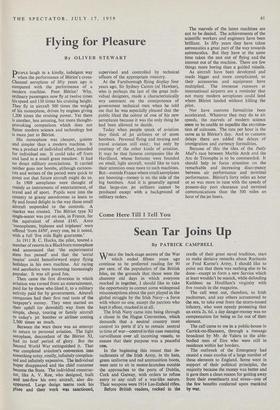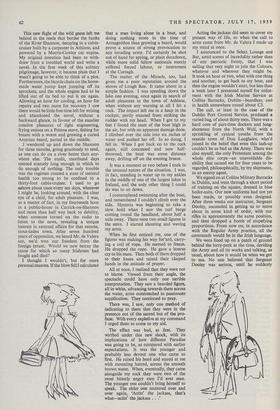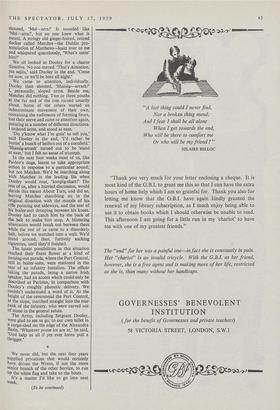Come Here Till I Tell You
Sean Tar Joins Up
By PATRICK CAMPBELL
WHILE the back-stage secrets of the War which ended fifteen years ago continue to be preferred reading for 90 per cent. of the population of the British Isles, on the grounds that those were the chummy old days in which everyone mucked in together, I should like to take the opportunity to correct some widespread misconceptions about the part played in the global struggle by the Irish Navy—a force with whom no one, except the patriots who kept it afloat, mucked in at all.
The Irish Navy came into being through a clause in the Hague Convention, which demands that a neutral country must control its ports if it's to remain neutral in time of war—control in this case meaning surveillance over all incoming vessels, to ensure that their purpose was a peaceful ono.
In the beginning this meant that de- tachments of the Irish Army, in tin hats, green uniforms and red ammunition boots, were sent to sit in motor-launches outside the approaches to the ports of Dublin, Cork and Galway, with orders to refuse entry to any craft of a war-like nature. Their weapons were 1914 Lee-Enfield rifles.
Before British readers, rocked in the
cradle of their great naval tradition, start to make derisive remarks about Ruritania or Fred Karno's Army, I should like to point out that there was nothing else to be done—except to form a new Service which at least wouldn't be seasick, while defending Kathleen na Houlihan's virginity with five rounds in the magazine.
The call went out, therefore, to Irish yachtsmen, and any others accustomed to the sea, to take over from the storm-tossed infantry, who were openly protesting that an extra 2s. 6d. a day danger-money was no compensation for being so far out of their element.
The call came to me in a public-house in Carrick-on-Shannon, through a message broadcast by Mr. de Valera to the able- bodied men of Eire who were still in residence within her borders.
The outbreak of the Emergency had caused a mass exodus of a large number of these elements to England. Some went in support of their political principles, the majority because the money was better and it gave them a clean reason for getting away from their sweethearts and wives—one of the few benefits conferred upon mankind by war, This now flight of the wild geese loft me behind in the reeds that border the banks of the River Shannon, decaying in a cabin- cruiser built by a carpenter in Athlone, and powered by a Morris-Cowley car engine. My original intention had been to with- draw from a troubled world and write a novel. In the first week of this solitary pilgrimage, however, it became plain that I wasn't going to be able to think of a plot. Furthermore, the bicycle chain on the home- made water pump kept jumping off its sprockets, and the whole engine had to be lifted out of its bed to put it on again. Allowing an hour for cooling, an hour for repairs and two more for recovery I saw there would be little free time left for writing and abandoned the novel, without a backward glance, in favour of the steadier creative pleasures of light engineering, frying onions on a Primus stove, fishing for bream with a worm and growing a curled Assyrian beard, parted in the middle.
I wandered up and down the Shannon for three months, going graciously to seed, as one can do on a river better than any- where else. The sunlit, moribund days seemed scarcely long enough in which to do enough of nothing. The only trouble was the regimen created a state of teetotal health too strong to be confined to a thirty-foot cabin-cruiser. I used to go ashore about once every ten days, wherever I might be, looking around, with the clear eye of a child, for adult pleasure. I was, as a matter of fact, in my fourteenth hour in a public-house in Carrick-on-Shannon and more than half way back to debility, when someone turned on the radio to listen to the news, revealing a unique interest in external affairs for that remote, stout-laden town. After seven hundred years of oppression, we heard Mr. de Valera say, we'd won our freedom from the foreign tyrant. Would we now betray the cause for which so many Irishmen had fought and died?
I thought I wouldn't, but for more personal reasons. If the blow fell I calculated
that a man living alone in a boat, and doing nothing more in the time of Armageddon than growing a beard, would prove a source of strong provocation to any invading army. I'd certainly be shot out of hand for spying, or plain decadence, while more solid fellow nationals merely suffered forced labour, or internment at the Curragh.
The matter of the Miracle, too, had given me a poor reputation around the shores of Lough Ree. It came about in a simple fashion. I was speeding down the lake one evening, once again in search of adult pleasures in the town of Athlone, when without any warning at all I hit a rock. The impact left me in a heap in the cockpit, partly stunned from striking the rudder with my head. When I got to my feet I found the stem of the boat high in the air, but with no apparent damage done. I climbed over the side into six inches of water and pushed her off. In so doing, I fell in. When I got back on to the rock again, still concussed and now half- drowned, the boat was some distance away, drifting off on the evening breeze.
It was a moment or two before I took in the unusual nature of the situation. I was, in fact, standing in water up to my ankles in the middle of one of the largest lakes in Ireland, and the only other thing I could do was to sit down.
I contemplated swimming after the boat, and remembered I couldn't climb over the side. Hysteria was beginning to take a slow hold when I saw the turf barge coming round the headland, about half a mile away. There were two small figures in the stern. I started shouting and waving my arms.
When he first noticed me, one of the figures was making his way for'ard, carry- ing a coil of rope. He seemed to freeze. He dropped the rope. He gave a hoarse cry to his mate. Then both of them dropped to their knees and raised their clasped hands in the attitude of prayer.
All at once, I realised that they were not to blame. Viewed from their angle, the spectacle could have only one terrible interpretation. They saw a bearded figure, all in white, advancing towards them across the water, arms outstretched in passionate supplication. They continued to pray.
There was, I saw, only one method of indicating to them that they were in the presence not of the sacred but of the pro- fane. With every expletive at my command I urged them to come to my aid.
The effect was bad, at first. They wirthed under this new shock, with its implications of how different Paradise was going to be, as compared with earlier expectations. It was the younger and probably less devout one who came to first. He raised his head and stared at me with mounting hatred, across the smooth brown water. When, eventually, they came alongside my rock they were two of the most bitterly angry men I'd ever seen. The younger one couldn't bring himself to speak. The older one muttered over and over again, 'Actin' the jackass, that's what—actin' the jackass . . Acting the jackass did seem to cover my present way of life, so when the call to arms came from Mr. de Valera I made up my mind at once.
I announced to the Select Lounge and Bar, amid scenes of incredulity rather than of any patriotic frenzy, that I was sailing that very night to join the Colours, whatever and wherever they might be. It took an hour or two, what with one thing and another, to get back to my boat, and then the engine wouldn't start, but less than a week later I presented myself for enlist- ment with the Irish Marine Service at Collins Barracks, Dublin—beardless, and in health somewhere round about C3.
The call, at least in the case of the Dublin Port Control Service, produced a varied bag, of about thirty men. There was a hard core of part-time dockers and long- shoremen from the North Wall, with a sprinkling of cynical youths from the seaside town of Dun Laoghaire, who'd joined in the belief that even this lash-up couldn't be as bad as the Army. There was also myself, the only Protestant among the whole elite corps—an unavoidable dis- ability that caused me for four years to be regarded, philosophically, by my shipmates, as an enemy agent.
We signed on at Collins Military Barracks in Dublin, and went through a short period of training on the square, dressed in blue boiler-suits. Our new uniforms had not yet been made, or possibly even designed. After three weeks our instructor, Sergeant Dooley, succeeded in getting us to move about in some kind of order, with our rifles in approximately the same position, and then dropped a bomb of stupefying proportions. From now on, in accordance with the Regular Army practice, all the commands would be in the Irish language.
We were lined up on a patch of ground behind the lorry-park at the time, deriding the Army and all its works and talking, as usual, about how it would be when we got to sea. No one believed that Sergeant Dooley was serious, until he suddenly shouted, 'Mel—arra!' It sounded like `Mel—arra l', but no one knew what it meant. A stringy old ginger-haired, retired docker called Matches—the Dublin pro- nunciation of Matthews—leant over to me and whispered querulously, 'What's eatin' him?'
We all looked at Dooley for a clearer directive. No one moved. 'That's Attention, yez eejits,' said Dooley in the end. 'Come on now, or we'll be here all night.'
We came to attention, individually. Dooley then shouted, `Shassig—arrashr I> personally, sloped arms. Beside me, Matches did nothing. Two or three youths at the far end of the line turned smartly about. Some of the others started an indeterminate movement of their own, containing the rudiments of forming fours, lost their nerve and came to attention again, pointing in a number of different directions. I ordered arms, and stood at ease.
`Do y'know what I'm goin' to tell you,' said Dooley in the end, 'I'd rather be bastin' a bunch of heifers out of a cornfield.' `Shassig-arrash' turned out to be 'stand at ease,' but I felt no sense of triumph.
In the next four weeks most of us, like Pavlov's dogs, learnt to take appropriate action in response to a particular sound; but not Matches. We'd be marching along with Matches in the leading file when Dooley would roar, `lompig-thart!' The rest of us, after a hurried discussion, would decide this meant About Turn, and did so, leaving Matches shambling on in the original direction with the muzzle of his rifle pointing out sideways, and the seat of his boiler-suit drooping between his knees. Dooley had to catch him by the back of the belt to make him stop. A blistering altercation would break out between them while the rest of us came to a disorderly halt, before we marched into a wall. We'd stand around, then, furtively sucking cigarettes, until they'd finished.
The latent possibilities in this situation reached their finest flower at a kind of Passing-out parade, where the Port Control, still in boiler-suits, were stationed in the rear of an infantry battalion. The officer taking the parade, being a native Irish speaker, had an accent which could only be described as Parisian, in comparison with Dooley's roughly phonetic delivery. We couldn't understand a word of it. At the height of the ceremonial the Port Control, at the slope, marched straight into the rear rank of the infantry, who were carved out of stone in the general salute.
The Army, including Sergeant Dooley, were glad to see us go, to our own billet in a cargo-shed on the edge of the Alexandra Basin. 'Whatever youse lot are at,' he said, God help us all if yez ever havta pull a thrigger.'
We never did, but the next four years supplied privations that would certainly have driven the Wrens, if not the more senior branch of the other Service, to run oP the white flag and take to the boats.
It's a matter I'd like to go into next Week.
(To be continued)








































 Previous page
Previous page